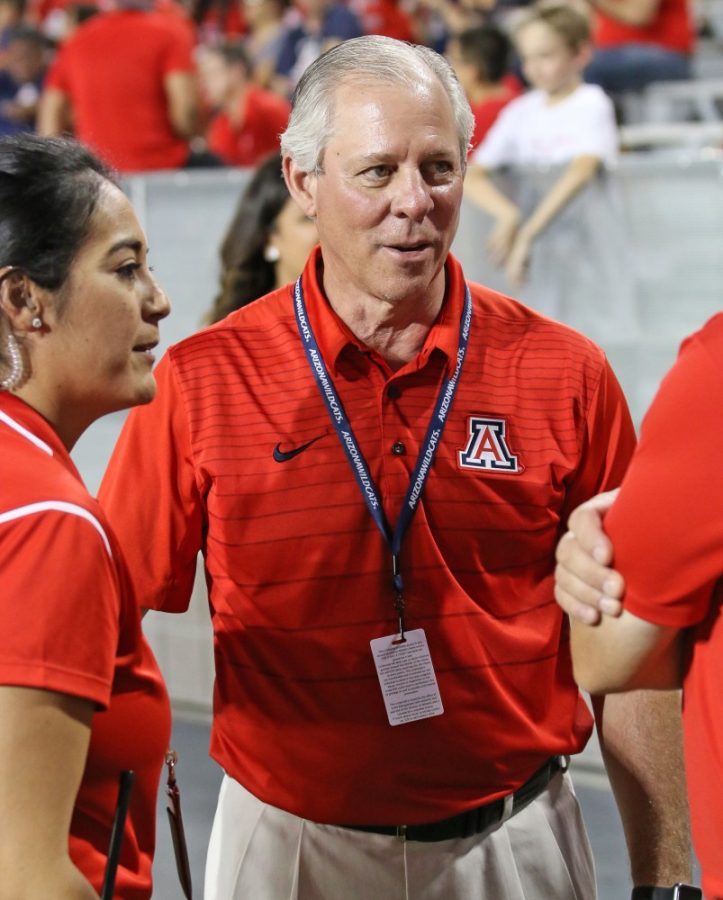Daily Wildcat reporter Sasha Hartzell interviewed with University of Arizona President Dr. Robert Robbins. They talked about his plans for his first UA Homecoming, his career and how he plans to differentiate himself from past UA presidents.
This is your first University of Arizona homecoming. How are you planning on celebrating it?
I hear that I’m supposed to get up and go to some restaurant for breakfast at 6 a.m. And I can’t remember the name of the restaurant, but I’m told that that’s tradition. So I’m going to get up particularly early and try to enjoy it. It’s one of the great traditions we have on campus. And of course I’m going to top it off by being down on the field when the final horn goes off and we win against Washington State. And that’ll be a good day.
Will your family be attending?
My sons live in California, so I’m not sure if they’re going to be able to come out or not.
Your career has taken you through many universities, from the University of Mississippi to Stanford. What is one of your favorite homecoming memory?
I used to love homecoming. I grew up on a little-bitty junior college campus in Mississippi where my grandfather taught mathematics for almost 50 years. And the town — it was just a little-bitty town, 1,500 people then, 1,500 people now — and there would be a big parade that went down Main Street. It started at the college campus where I lived and was about a mile parade out there to Main Street. Everybody just got so into it. It was a really, really big deal. You know, I feel like I’m returning back to that time. Stanford they didn’t even call it homecoming, they called it “Reunion Weekend.” It was nice, but I was working, doing heart surgery then. I just think Tucson has such a soul about it and the U of A has such great traditions and the alumni are so passionate about the university that I’m just really excited … Tucson is a little bit of a smaller town; it’s a big deal to have homecoming, and we make it a big deal on campus. I’m really excited about not just Saturday but the whole next week. I’m hoping we’re coming back from Berkeley with a victory tomorrow.
RELATED: Governor, UA President ‘break ground’ on Building 90
What part of the homecoming are you most excited for?
I think I’m most excited for the football game because I think we’re on a real roll. If we can win tomorrow, homecoming will not only be great for the tradition and the sentimental value of it, but we’ll be right in the heart to then go the next week to Los Angeles to play Southern Cal, which would be essentially for the right to represent the Pac-12 South in the championship game, then to go to our first Rose Bowl. I cannot believe that the Wildcats have never been to the Rose Bowl, so I’m excited about winning the football game. I am looking forward to retiring my jersey as a Wildcat for life.
What do you anticipate is going to be different about the UA’s homecoming, in contrast with other homecomings you’ve attended?
For me, it’ll be that I’m so lucky to be here and so humble about the opportunity to lead this university. Homecoming will be special to me because I’m the person that everyone looks to to lead this university. At the other ones I’ve been more of a casual observer. But this is my life, and I want people to come back and remember their time of being here on campus, get really excited about the things that we are doing at the university now and what we’ll do over the next 10 years. I hope I’m lucky enough to stay here for 10 years and retire as a Wildcat forever. I feel a sense of responsibility of making the trip back to campus one that will be worth it, one [where alumni] will meet their friends from days gone by and hopefully connect and meet new friends [and], most importantly, be proud of the direction the university is going in and of the great things we’re doing — not only on the sports field and courts, but more importantly what we’re doing academically, how we’re discovering new knowledge, how we’re transferring that new knowledge and training the next generation of leaders to go out into the community and do great things.
For many alumni and family members, this is the one time per year they travel back to the UA. This is the one opportunity per year that you can send them a message and they can see how you’re leading the university. What message about the UA do you want them to take home?
I want them to know that even though I’ve only been here for a few months, I am completely dedicated to the success, the future success, of the university. We are just starting … a strategic planning process that will help provide the road map for [the] future direction of the university over the next five, 10, 15 years, and I want [alumni] to be involved in that process. I would love to hear their ideas about we know that we have a great university, how can we advance it and make it even greater. I’m very interested in learning from current students, faculty, staff, community individuals, our alumni, parents of our students. We’re going to give everyone an opportunity to have their voice heard in this process. I think that that’s the best way of advancing the university. I’m really excited about all the things we’re going to do and that all Wildcat nation will get to participate in helping shape the direction of the university.
RELATED: Q&A with new president, Dr. Robert C. Robbins
So what is your vision for the direction of the university?
I believe as a land-grant university we’ve got the opportunity to, and the responsibility to, look at all segments of the mission of the university, whether it be agriculture, whether it be human health, engineering, philosophy, the arts, humanity. We have such a broad and diverse mission. I believe we are positioned with all of our accomplishments, being one of the top 35 research universities that at the same time is very student-centric, that we have a tremendous opportunity and responsibility to leverage all of our assets together to prepare our students for a life of work in a rapidly changing world. I often reference the fourth industrial revolution, where there’s an emergence of physical science, biological science, digital science and the dramatic effect that this rapidly changing world is going to have on humanity and society. I think that the vision I have for the University of Arizona would be to step up over the next 10, 15, 20 years and be a global leader as we contemplate all of these changes, to prepare our students for a lifetime where they’ll have five, 10, 15 jobs in their lifetime, prepare them by giving them an education, the highest quality of education and skills that will allow them to be successful in the early stages of the fourth industrial revolution. However, I think we need to focus our research strategies around the collaborative efforts of the convergence of these three areas of expertise so that we can discover the next new thing, the next transformational technique, or service, or device, or process that will simply make the world a better place. I think we’ve got a great opportunity to do that.
What do you want homecoming attendees and visitors to know about how you’re going to differentiate your presidential legacy from the last president’s?
I’ve gotten to meet all the living former presidents, except for president Shelton. I haven’t gotten to meet him yet, but I’ve gotten to spend a lot of time talking to him. Those are big shoes to fill. I just hope that my legacy will be one that I was able to get people inspired and excited about the future, transform. Speak to all the former presidents, they will point to President John Schaefer. They all say that President Schaefer, who was president of our university at age 37, was the most transformational president in our history. And when I ask him about that, he says, “Yes, I was.” I don’t for a minute think that I’ll be as transformational as President Schaefer, but I’d like to be known as the person who really inspired and brought all the stakeholders at the university together to have a second transformation, if you will, in reference to Schaefer. [A transformation ] that we will bring people together, that we will educate in a different manner. I’m really a big fan of active learning and collaborative learning, so I’m hoping that we will buy into that methodology of education and also we’ll bring all of our great colleges together in a collaborative, cooperative way so that we will discover new knowledge, that we will have discovery of the next new process in human health, or in astronomy, or optical science, or economy — with these three disciplines coming together: physical, biological, and digital science.
I think we have an opportunity and a moment in time where the U of A is ready for something huge and transformational again, just as they were in the days of President Schaefer. And I hope that I’ll be known as the president who willed us to the Rose Bowl and won a national championship in multiple sports. So that’s a lot.
Follow President Dr. Robert Robbins and the Daily Wildcat on Twitter









